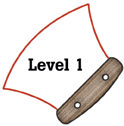
Alaska Science
Key Element D4
A student who meets the content standard should evaluate the scientific and social merits of solutions to everyday problems.
 |
Alaska Science A student who meets the content standard should evaluate the scientific and social merits of solutions to everyday problems. |
|
Performance Standard Level 1, Ages 5–7
|
|
|
|
Sample Assessment Ideas
|
Standards Cross-References
|
||
|
National Science Education Standards Evaluate a product or design. Students should evaluate their own results or solutions to problems, as well as those of other children, by considering how well a product or design met the challenge to solve a problem. When possible, students should use measurements and include constraints and other criteria in their evaluations. They should modify designs based on the results of evaluations. (Page 137) People have always had problems and invented tools and techniques (ways of doing something) to solve problems. Trying to determine the effects of solutions helps people avoid some new problems. (Page 138) Tools help scientists make better observations, measurements, and equipment for investigations. Tools help scientists see, measure, and do things that they could not otherwise see, measure, and do. (Page 138) People continue inventing new ways of doing things, solving problems, and getting work done. New ideas and inventions often affect other people; sometimes the effects are good and sometimes they are bad. It is helpful to try to determine in advance how ideas and inventions will affect other people. (Page 140) Science and technology have greatly improved food quality and quantity, transportation, health, sanitation, and communication. These benefits of science and technology are not available to all of the people in the world. (Page 141) |
Benchmarks People, alone or in groups, are always inventing new ways to solve problems and get work done. The tools and ways of doing things that people have invented affect all aspects of life. (Page 54) When a group of people wants to build something or try something new, they should try to figure out ahead of time how it might affect other people. (Page 54) |
|
Table of Contents | Return to Alaska Native Knowledge Network